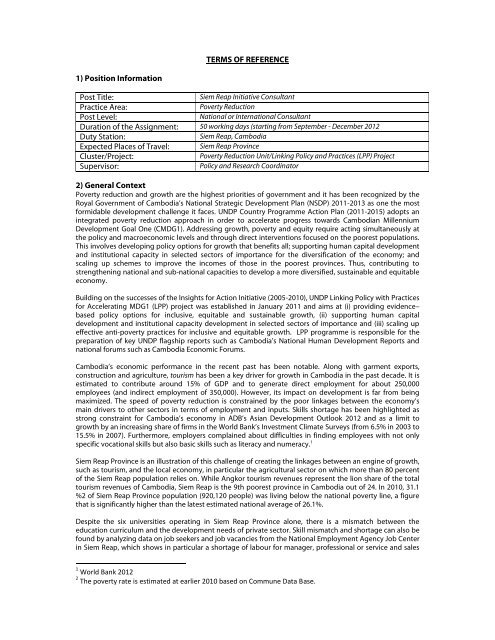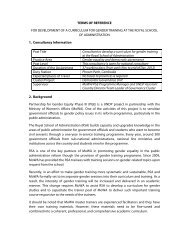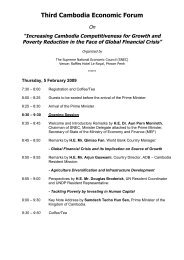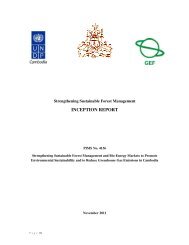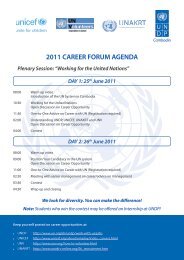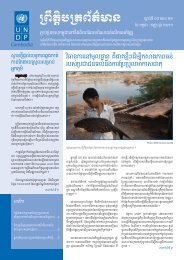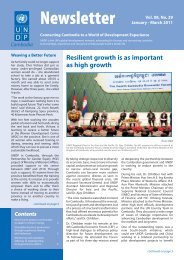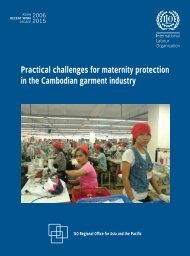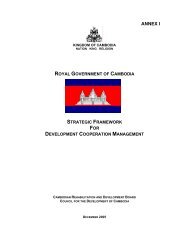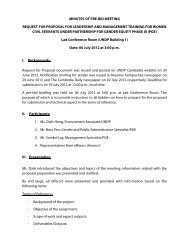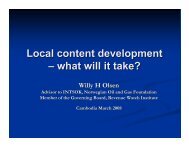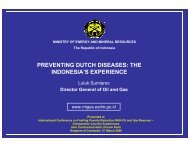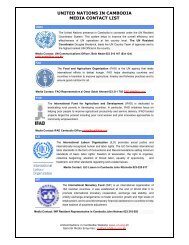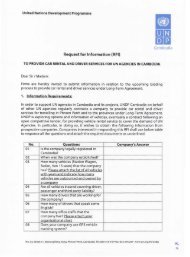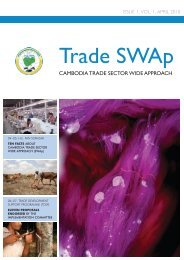TOR - Siem Reap Initiative Consultant.pdf - United Nations in ...
TOR - Siem Reap Initiative Consultant.pdf - United Nations in ...
TOR - Siem Reap Initiative Consultant.pdf - United Nations in ...
- No tags were found...
Create successful ePaper yourself
Turn your PDF publications into a flip-book with our unique Google optimized e-Paper software.
TERMS OF REFERENCE<br />
1) Position Information<br />
Post Title:<br />
<strong>Siem</strong> <strong>Reap</strong> <strong>Initiative</strong> <strong>Consultant</strong><br />
Practice Area:<br />
Poverty Reduction<br />
Post Level:<br />
National or International <strong>Consultant</strong><br />
Duration of the Assignment: 50 work<strong>in</strong>g days (start<strong>in</strong>g from September - December 2012<br />
Duty Station:<br />
<strong>Siem</strong> <strong>Reap</strong>, Cambodia<br />
Expected Places of Travel:<br />
<strong>Siem</strong> <strong>Reap</strong> Prov<strong>in</strong>ce<br />
Cluster/Project:<br />
Poverty Reduction Unit/L<strong>in</strong>k<strong>in</strong>g Policy and Practices (LPP) Project<br />
Supervisor:<br />
Policy and Research Coord<strong>in</strong>ator<br />
2) General Context<br />
Poverty reduction and growth are the highest priorities of government and it has been recognized by the<br />
Royal Government of Cambodia’s National Strategic Development Plan (NSDP) 2011 -2013 as one the most<br />
formidable development challenge it faces. UNDP Country Programme Action Plan (2011-2015) adopts an<br />
<strong>in</strong>tegrated poverty reduction approach <strong>in</strong> order to accelerate progress towards Cambodian Millennium<br />
Development Goal One (CMDG1). Address<strong>in</strong>g gro wth, poverty and equity require act<strong>in</strong>g simultaneously at<br />
the policy and macroeconomic levels and through direct <strong>in</strong>terventions focused on the poorest populations.<br />
This <strong>in</strong>volves develop<strong>in</strong>g policy options for growth that benefits all; support<strong>in</strong>g human capital development<br />
and <strong>in</strong>stitutional capacity <strong>in</strong> selected sectors of importance for the diversification of the economy; and<br />
scal<strong>in</strong>g up schemes to improve the <strong>in</strong>comes of those <strong>in</strong> the poorest prov<strong>in</strong>ces. Thus, contribut<strong>in</strong>g to<br />
strengthen<strong>in</strong>g national and sub-national capacities to develop a more diversified, susta<strong>in</strong>able and equitable<br />
economy.<br />
Build<strong>in</strong>g on the successes of the Insights for Action <strong>Initiative</strong> (2005-2010), UNDP L<strong>in</strong>k<strong>in</strong>g Policy with Practices<br />
for Accelerat<strong>in</strong>g MDG1 (LPP) project was established <strong>in</strong> January 2011 and aims at (i) provid<strong>in</strong>g evidence–<br />
based policy options for <strong>in</strong>clusive, equitable and susta<strong>in</strong>able growth, (ii) support<strong>in</strong>g human capital<br />
development and <strong>in</strong>stitutional capacity development <strong>in</strong> selected sectors of importance and (iii) scal<strong>in</strong>g up<br />
effective anti-poverty practices for <strong>in</strong>clusive and equitable growth. LPP programme is responsible for the<br />
preparation of key UNDP flagship reports such as Cambodia’s National Human Development Reports and<br />
national forums such as Cambodia Economic Forums.<br />
Cambodia’s economic performance <strong>in</strong> the recent past has been notable. Along with garment exports,<br />
construction and agriculture, tourism has been a key driver for growth <strong>in</strong> Cambodia <strong>in</strong> the past decade. It is<br />
estimated to contribute around 15% of GDP and to generate direct employment for about 250,000<br />
employees (and <strong>in</strong>direct employment of 350,000). Howe ver, its impact on development is far from be<strong>in</strong>g<br />
maximized. The speed of poverty reduction is constra<strong>in</strong>ed by the poor l<strong>in</strong>kages between the economy’s<br />
ma<strong>in</strong> drivers to other sectors <strong>in</strong> terms of employment and <strong>in</strong>puts. Skills shortage has been highlighted as<br />
strong constra<strong>in</strong>t for Cambodia’s economy <strong>in</strong> ADB’s Asian Development Outlook 2012 and as a limit to<br />
growth by an <strong>in</strong>creas<strong>in</strong>g share of firms <strong>in</strong> the World Bank’s Investment Climate Surveys (from 6.5% <strong>in</strong> 2003 to<br />
15.5% <strong>in</strong> 2007). Furthermore, employers compla<strong>in</strong>ed about difficulties <strong>in</strong> f<strong>in</strong>d<strong>in</strong>g employees with not only<br />
specific vocational skills but also basic skills such as literacy and numeracy. 1<br />
<strong>Siem</strong> <strong>Reap</strong> Prov<strong>in</strong>ce is an illustration of this challenge of creat<strong>in</strong>g the l<strong>in</strong>kages between an eng<strong>in</strong>e of growth,<br />
such as tourism, and the local economy, <strong>in</strong> particular the agricultural sector on which more than 80 percent<br />
of the <strong>Siem</strong> <strong>Reap</strong> population relies on. While Angkor tourism revenues represent the lion share of the total<br />
tourism revenues of Cambodia, <strong>Siem</strong> <strong>Reap</strong> is the 9th poorest prov<strong>in</strong>ce <strong>in</strong> Cambodia out of 24. In 2010, 31.1<br />
%2 of <strong>Siem</strong> <strong>Reap</strong> Prov<strong>in</strong>ce population (920,120 people) was liv<strong>in</strong>g below the national poverty l<strong>in</strong>e, a figure<br />
that is significantly higher than the latest estimated national average of 26.1%.<br />
Despite the six universities operat<strong>in</strong>g <strong>in</strong> <strong>Siem</strong> <strong>Reap</strong> Prov<strong>in</strong>ce alone, there is a mismatch between the<br />
education curriculum and the development needs of private sector. Skill mismatch and shortage can also be<br />
found by analyz<strong>in</strong>g data on job seekers and job vacancies from the National Employment Agency Job Center<br />
<strong>in</strong> <strong>Siem</strong> <strong>Reap</strong>, which shows <strong>in</strong> particular a shortage of labour for manager, professional or service and sales<br />
1 World Bank 2012<br />
2 The poverty rate is estimated at earlier 2010 based on Commune Data Base.
worker positions. On the supply side, <strong>Siem</strong> <strong>Reap</strong> prov<strong>in</strong>ce has a very low educated base which is a major<br />
impediment. Exist<strong>in</strong>g studies recognize that although tourism has been significant for economic growth, its<br />
impacts on the local communities and poverty reduction have been very limited. 3. Those studies show that<br />
benefits from tourism accrue to the communities liv<strong>in</strong>g <strong>in</strong> the vic<strong>in</strong>ity of <strong>Siem</strong> <strong>Reap</strong> temple sites while the<br />
best benefit for the poor is noth<strong>in</strong>g more than low-paid employment as they do not usually have capital,<br />
social networks, required skills or education for better paid employment.<br />
Aga<strong>in</strong>st this background, UNDP has agreed with the Governor of <strong>Siem</strong> <strong>Reap</strong> to explore ways for transform<strong>in</strong>g<br />
the tourism sector <strong>in</strong>to a more <strong>in</strong>clusive one and to improve employment opportunities and access to jobs<br />
for the local population, especially youth and women, by improv<strong>in</strong>g the match of skill-sets with market<br />
demands through targeted tra<strong>in</strong><strong>in</strong>g and higher engagement with private sector.<br />
3) Scope of Work<br />
To tackle these issues <strong>in</strong>clud<strong>in</strong>g labour/skill shortage and skill mismatch, the cont<strong>in</strong>u<strong>in</strong>g migration dynamic<br />
of the <strong>Siem</strong> <strong>Reap</strong> workforce to neighbour<strong>in</strong>g countries and the <strong>in</strong>adequate employability of youth and<br />
women, UNDP started the <strong>Siem</strong> <strong>Reap</strong> <strong>Initiative</strong> (Inclusive Tourism and Employability of Youth and Women for<br />
poverty reduction) <strong>in</strong> 2012 which primarily focuses on three objectives:<br />
(a)<br />
(b)<br />
(c)<br />
Support<strong>in</strong>g local authorities to establish a Human Capital and Skill Development Strategic Plan<br />
(HCSDSP) to support the implementation of the 2011-2015 Prov<strong>in</strong>cial Development Plan and the 3<br />
year public <strong>in</strong>vestment roll<strong>in</strong>g plan.<br />
Improv<strong>in</strong>g access to quality tra<strong>in</strong><strong>in</strong>g to help youth and women form poor communities to get the<br />
right skills and knowledge and maximize their potential for employability.<br />
Improv<strong>in</strong>g access to <strong>in</strong>formation <strong>in</strong> order to assist youth and women (<strong>in</strong>clud<strong>in</strong>g from poor<br />
communities) <strong>in</strong> decision mak<strong>in</strong>g regard<strong>in</strong>g employment selection and on tra<strong>in</strong><strong>in</strong>g/education<br />
choices.<br />
In the effort to achieve those target objectives, the scope of work of the consultant is to provide technical<br />
assistance to produce three years HCSDSP for <strong>Siem</strong> <strong>Reap</strong> <strong>in</strong> order to support the implementation of the<br />
2011-2015 Prov<strong>in</strong>cial Development Plan and the 3 year public <strong>in</strong>vestment roll<strong>in</strong>g plan.<br />
The scope of the assignment will cover:<br />
<br />
<br />
<br />
<br />
<br />
Review and analyze relevant and exist<strong>in</strong>g literature and conduct consultation to generate<br />
necessary <strong>in</strong>formation;<br />
Indicate available evidence and data gaps;<br />
Based on the literature and consultations with relevant stakeholder, analyse the overall<br />
development pattern and the dynamic of the labour market for the prov<strong>in</strong>ce. This <strong>in</strong>cludes<br />
identify<strong>in</strong>g who are the ma<strong>in</strong> employees <strong>in</strong> Tourism <strong>in</strong>dustry; local residents or migrants from<br />
other prov<strong>in</strong>ces, and analyse the characteristics and skills level of the current labour force;<br />
Engage with stakeholder to further develop HCSDSP for the prov<strong>in</strong>ce <strong>in</strong> a participatory manner<br />
with emphasis on strong ownership from government counterpart, <strong>Siem</strong> <strong>Reap</strong> authority. The<br />
methodology should <strong>in</strong>clude:<br />
o The rational for HCSDSP;<br />
o The process to develop HCSDSP;<br />
o The proposed management structure/arrangement to facilitate the development of<br />
HCSDSP (ex. A work<strong>in</strong>g group), the proposed composition and the role and<br />
responsibility of the related parties;<br />
Develop a clearly articulated draft of HCSDSP for the prov<strong>in</strong>ce to promote equitable access to<br />
education and skill development opportunity and that <strong>in</strong>cludes:<br />
o The target sectors that will generate employment for the prov<strong>in</strong>ce <strong>in</strong> the future;<br />
o Alignment with national framework related to human capital and skills development. For<br />
example, Qualification Framework of M<strong>in</strong>istry of Tourism for TVET <strong>in</strong> tourism sector.<br />
o What are the skills needed;<br />
o How to address those skill gaps through formal education, tra<strong>in</strong><strong>in</strong>g, <strong>in</strong>formal education,<br />
etc.;<br />
o Fund<strong>in</strong>g mechanism/modality and related f<strong>in</strong>anc<strong>in</strong>g sources for public expenditure on<br />
HCSDSP, whether it should be built from exist<strong>in</strong>g one or from outside;<br />
3 Ballard 2005; World Bank 2006; H<strong>in</strong>g and Tout 2007
o Institutional mechanism for coord<strong>in</strong>at<strong>in</strong>g and implement<strong>in</strong>g HCSDSP;<br />
o The current challenges while provid<strong>in</strong>g medium and longer term <strong>in</strong>tervention to address<br />
the skill problem for the prov<strong>in</strong>ce;<br />
o A plan to build capacity of the relevant government officials to ensure the successful<br />
implementation of the proposed HCSDSP;<br />
Conduct consultations or validation workshop as required, with support from the <strong>Siem</strong> <strong>Reap</strong><br />
<strong>Initiative</strong> Local Coord<strong>in</strong>ator, with relevant stakeholder to generate further <strong>in</strong>put and to<br />
delivered the agreed outputs;<br />
Provides technical <strong>in</strong>puts and feedback to the <strong>Siem</strong> <strong>Reap</strong> Labour Market Study to be conducted<br />
by National Employment Agency (NEA);<br />
Prepare a concept note for a Human Capital and Skill Development Prov<strong>in</strong>cial Fund;<br />
Prepare and provide a presentation related to <strong>Siem</strong> <strong>Reap</strong> labour market from Human Capital<br />
Development lens. The presentation should <strong>in</strong>clude the experience on the relevant best<br />
practices from other countries <strong>in</strong> the similar context;<br />
Prepare presentation on HCSDSP for <strong>Siem</strong> <strong>Reap</strong> and the presentation of the concept note for a<br />
Human Capital and Skill Development Prov<strong>in</strong>cial Fund for the stakeholder<br />
workshop/meet<strong>in</strong>g(s) to dissem<strong>in</strong>ate those two outputs.<br />
4) F<strong>in</strong>al Products or Deliverables/Outputs<br />
Key deliverables of the assignment are:<br />
<br />
<br />
Human Capital and Skill Development Strategic Plan (HCSDSP): Clearly articulated and agreed 3-year<br />
HCSDSP that is aligned with national and <strong>in</strong>ternational private sector <strong>in</strong>vestments pipel<strong>in</strong>e and<br />
current specific sector needs <strong>in</strong> the prov<strong>in</strong>ce <strong>in</strong> order to support the local authorities <strong>in</strong> the<br />
implementation of the 2011-2015 prov<strong>in</strong>cial development plan and the 3-year public <strong>in</strong>vestment<br />
roll<strong>in</strong>g plan. – End of December 2012<br />
Concept note for a Human Capital and Skill Development Prov<strong>in</strong>cial Fund: To def<strong>in</strong>e requirements for a<br />
Human Capital and Skill Development Prov<strong>in</strong>cial Fund. This concept note takes part <strong>in</strong> support<strong>in</strong>g<br />
the implementation of HCSDSP by end of December 2012.<br />
Presentation related to <strong>Siem</strong> <strong>Reap</strong> labor market from Human Capital Development lens : Clear<br />
presentation on the mentioned topic with outl<strong>in</strong><strong>in</strong>g <strong>in</strong>ternational best practice dur<strong>in</strong>g the<br />
prov<strong>in</strong>cial Job Fair <strong>in</strong> <strong>Siem</strong> <strong>Reap</strong>. – Third Week of October 2012.<br />
In order to produce the above mention deliverables, the consultant will be given a period of 50 days over a<br />
4-month period. A tentative work plan is outl<strong>in</strong>ed <strong>in</strong> the table below and a detailed schedule will be further<br />
elaborated at the beg<strong>in</strong>n<strong>in</strong>g of the consultancy <strong>in</strong> coord<strong>in</strong>ation with UNDP.<br />
Task<br />
Days required<br />
Desk review and consultations with relevant stakeholder 10<br />
Produce first draft of Human Capital and Skill Development Strategic Plan 20<br />
Produce first draft of concept note for a Human Capital and Skill<br />
10<br />
Development Prov<strong>in</strong>cial fund<br />
Provide presentation and facilitate the consultation/stakeholder workshop<br />
10<br />
to f<strong>in</strong>alize the Human Capital and Skill Development Strategic Plan and<br />
concept note for a Human Capital and Skill Development Prov<strong>in</strong>cial Fund<br />
TOTAL 50<br />
The consultant must be based <strong>in</strong> Cambodia. A more detailed timeframe will be further elaborated with<br />
UNDP once the consultant is selected.<br />
As part of the evaluation criteria, to apply for this job, the consultant must provide the proposed<br />
methodology to deliver the expected outputs along with his/her CV.
5) Institutional Arrangement<br />
To deliver the outputs of the assignment, the consultant will work <strong>in</strong> close collaboration with the Poverty<br />
Reduction Unit team, <strong>in</strong> particular with the <strong>Siem</strong> <strong>Reap</strong> Local Coord<strong>in</strong>ator, the Human Development Officer,<br />
and the Poverty Reduction Unit team leader, but also with the prov<strong>in</strong>cial authority and other stakeholders.<br />
6) Monitor<strong>in</strong>g and Progress Controls<br />
The consultant will work under the overall supervision of the LPP Policy and Research Coord<strong>in</strong>ator. The<br />
Human Development Officer will be responsible for keep<strong>in</strong>g track of the progress made by the consultant<br />
base on the agreed work plan and deliverables. On daily basis, to deliver the expected outputs, the<br />
consultant will work closely with <strong>Siem</strong> <strong>Reap</strong> Local Coord<strong>in</strong>ator.<br />
7) Payment Milestones<br />
<strong>Consultant</strong> will be paid on a lump sum basis under the follow<strong>in</strong>g <strong>in</strong>stallments:<br />
1) (15%) 1st payment, upon submission of work plan/ref<strong>in</strong>ed methodology to conduct the<br />
assignment;<br />
2) (25%) 2nd payment, upon completion of the presentation related to <strong>Siem</strong> <strong>Reap</strong> labor market<br />
dur<strong>in</strong>g the job fair <strong>in</strong> <strong>Siem</strong> <strong>Reap</strong>;<br />
3) (30%) 3rd payment, upon submission and acceptance of Human Capital and Skill Development<br />
Strategic Plan (HCSDSP) for <strong>Siem</strong> <strong>Reap</strong>;<br />
4) (30%) 4 th (f<strong>in</strong>al) payment, upon submission and acceptance of concept note for a Human Capital<br />
and Skill Development Prov<strong>in</strong>cial fund.<br />
8) M<strong>in</strong>imum Qualifications Requirement<br />
Education:<br />
Experience:<br />
Competencies:<br />
Master or PhD <strong>in</strong> economics, education, public policy, <strong>in</strong>ternational development<br />
studies, and/or related subjects.<br />
At least seven years of work experience at national and <strong>in</strong>ternational level <strong>in</strong> social<br />
science – sociology, development studies, and/or labor market and skill<br />
development at theoretical level and practical level <strong>in</strong> the field;<br />
Proven relevant experience <strong>in</strong> Cambodia or a development country <strong>in</strong> Southeast<br />
Asia on related project context and <strong>in</strong> multi stakeholder environment <strong>in</strong>clud<strong>in</strong>g<br />
development organization, national counterpart, civil society, private sector;<br />
Broad knowledge of sub-national adm<strong>in</strong>istration, tourism and employment;<br />
Substantial experience <strong>in</strong> provid<strong>in</strong>g policy advise <strong>in</strong> the area related to human<br />
capital;<br />
Substantial experience work<strong>in</strong>g and engag<strong>in</strong>g with senior government officials,<br />
donor representatives and civil society on policy and strategic issues;<br />
Substantial experience <strong>in</strong> work<strong>in</strong>g on complex policy-based research related to<br />
economics, human development, rural development, etc.;<br />
Experience <strong>in</strong> provid<strong>in</strong>g substantive <strong>in</strong>puts <strong>in</strong>to technical documents and<br />
mentor<strong>in</strong>g researchers <strong>in</strong> develop<strong>in</strong>g countries;<br />
Ability to write effectively, particularly technical and policy papers and studies.<br />
Excellent presentation and communication skills;<br />
Previous experience or familiarity with the UN/UNDP is an asset.<br />
Strong analytical skills and critical th<strong>in</strong>k<strong>in</strong>g skills<br />
Good facilitation and presentation skill;<br />
Demonstrate ability to communicate effectively with various partners <strong>in</strong>clud<strong>in</strong>g the<br />
government, civil society, private sector, UN and other development donors and<br />
high quality liaison and representation at local and national levels;<br />
Strong <strong>in</strong>terpersonal and cross-cultural skills and ability to foster relationships with<br />
key stakeholders from donors, government counterpart, and other local partners;<br />
Understand<strong>in</strong>g of gender ma<strong>in</strong>stream<strong>in</strong>g, youth employment and challenges;
Ability to work under pressure, effectively coord<strong>in</strong>ate research team and meet tight<br />
deadl<strong>in</strong>es without compromis<strong>in</strong>g quality of work.<br />
Computer literacy and knowledge of standard PC software packages (MS. Excel,<br />
PowerPo<strong>in</strong>t, Word, etc.) is essential. Experience <strong>in</strong> the use of web based<br />
management systems is an asset.<br />
Language<br />
Requirements::<br />
Strong command of written and spoken English.


